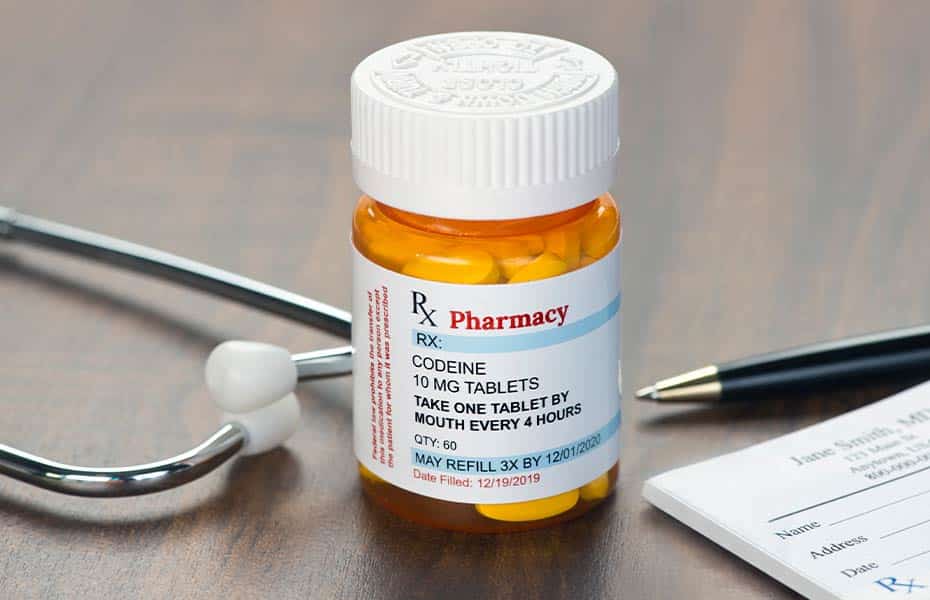Massachusetts Center for Addiction
Codeine Addiction

Codeine addiction is a growing concern that often goes unnoticed. As a commonly prescribed medication for pain and cough relief, codeine’s medical benefits are undeniable. However, its potential for misuse and codeine addiction casts a long shadow over these therapeutic uses.
What Is Codeine?
Codeine is a Schedule II medication that belongs to the class of drugs known as opioids. It is derived from the opium poppy plant and is commonly used as a pain reliever and cough suppressant.
Codeine works by binding to opioid receptors in the brain, which helps to reduce the sensation of pain. It is available in various forms, including tablets, capsules, and syrups, and is typically prescribed by doctors for short-term use.
Codeine Addiction
Codeine addiction happens when someone uses the drug too much or for too long. This drug is used to help with pain and coughing, but if it’s not used correctly, it can be addictive. This means that a person might feel like they need to take it all the time, even when they don’t have pain or a cough anymore.
When someone is addicted to codeine, they might start to take more of it than their doctor said to. Some people may abuse it without a doctor’s prescription at all. They might also feel sick, anxious, or uncomfortable if they try to stop taking it. This is because their body has gotten used to having the medicine and feels like it can’t function without it. This is called tolerance.

Signs and Symptoms of Codeine Addiction
Recognizing the early signs of addiction can help in addressing the issue promptly. Here’s a comprehensive list of signs of codeine addiction:
- Increasing the dose of codeine to experience the same level of pain relief or satisfaction.
- Experiencing intense cravings or a persistent urge to take codeine.
- Continuing to use codeine despite it causing problems in relationships, work, or social activities.
- Spending a lot of time obtaining, using, or recovering from the effects of codeine.
- Neglecting responsibilities at home, work, or school because of codeine use.
- Using codeine in dangerous situations, such as while driving.
- Experiencing withdrawal symptoms when not taking codeine, such as nausea, sweating, shaking, and anxiety.
- Making unsuccessful attempts to cut down or control codeine use.
- Losing interest in hobbies or activities that were once enjoyable.
- Lying or being secretive about the amount of codeine used or the frequency of use.
- Borrowing or stealing codeine or money to buy codeine.
- Feeling unable to function normally without codeine.
When someone is addicted to codeine, they might experience a range of physical symptoms as their body becomes dependent on the drug. These symptoms can vary in severity and might include:
- Nausea, sometimes leading to vomiting
- Regular constipation
- A noticeable bluish tint to lips and fingernails, indicating oxygen deprivation
- Muscle discomfort, including twitches or spasms
- Episodes of dizziness or fainting, particularly when standing up quickly
- Persistent dry mouth
- Skin issues such as itching or the development of rashes
- Problems with urination, either difficulty starting or a reduced flow
- Unusually low blood pressure, which can cause additional health issues
- The occurrence of seizures in severe cases
- Reduced rate of breathing, which can be dangerous
- Cold, clammy skin, particularly on the hands and feet
- Abdominal pain without a clear cause
- Visual disturbances, including blurred or altered vision
These signs and symptoms indicate that codeine use may have progressed to codeine dependency or addiction. If you or someone you know exhibits these behaviors, it’s important to seek professional help. A healthcare provider can offer advice on the best course of action. This may include treatment options such as detox, therapy, and support groups.
Treatment Options for Codeine Addiction
Treating codeine addiction often begins with detox. Following detox, counseling and therapy may be attended to address the underlying causes of addiction.
Inpatient rehab programs provide a comprehensive and structured environment for recovery, offering 24/7 medical supervision and clinical care. These programs also ensure a drug-free environment, significantly reducing the temptation and risk of relapse.
On the other hand, outpatient rehab programs offer a flexible approach that allows individuals to maintain their daily responsibilities, such as work or school while receiving treatment. These programs are often more affordable and enable patients to utilize their existing support networks of friends and family.
Whether opting for an inpatient or outpatient program, accessing professional treatment services is vital. Both paths involve therapy and counseling, which are key components of a successful recovery.
Overcoming Codeine Addiction
If you or someone you know is dealing with codeine addiction, remember that there’s a way out. Recognizing the signs and understanding the impact of codeine is the beginning of the recovery journey.
Getting back to a healthy life requires the right support and guidance. Specialized professionals in addiction treatment can offer the best advice and strategies.
The Massachusetts Center for Addiction is a trusted place to turn to. They provide the expertise and resources you need to overcome this challenge. In this journey, you’re never alone. Call 844-486-0671 today to get started.





